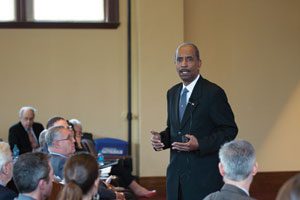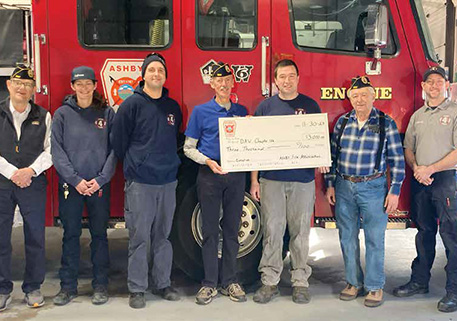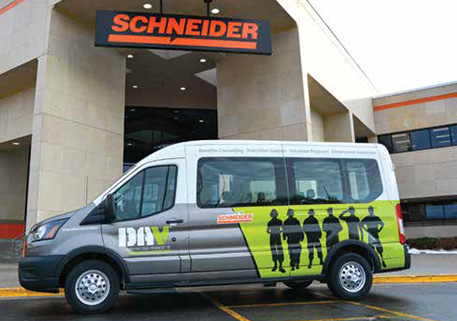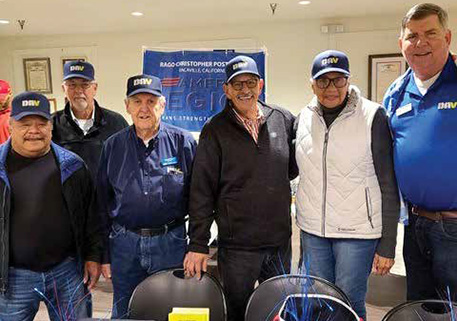
Judge Robert Russell is no stranger to establishing courts. He created the drug treatment court in Buffalo, N.Y., in 1995 and the city’s mental health treatment court in 2002, providing offenders a comprehensive approach to address addiction, dependency and mental health issues that can lead to legal or criminal issues.
During his time on the bench overseeing these courts, Russell also began to notice an influx of veterans on his court dockets, and he decided it was time to address the problem.
Russell recognized that many veterans have a difficult time readjusting to life after service. He proposed a court program designed specifically to address the needs of veterans in the criminal justice system and connect them to the benefits and treatment they earned while serving. Russell then began organizing meetings with representatives from the Department of Veterans Affairs, various veterans groups and volunteer veterans from the community to plan the concept of the Veterans Treatment Court.
In January 2008, Russell established and began presiding over the nation’s very first Veterans Treatment Court in Buffalo. Today, there are over 300 such courts across the country.
Russell recently reflected on the court’s beginning, his motivation for the project and the path ahead while delivering the third annual DAV Distinguished Speaker Lecture at Harvard Law School.
“When I think about Veterans Treatment Court, what differs from my drug court or my mental health court is the prior experiences of our veterans,” said Russell. “Those prior experiences really can be a tremendous benefit. We are looking at a group of individuals—men and women who served—who have patriotism, camaraderie, teamwork and self-reliance. How can we tap into that spirit to give them the best opportunity at success?”
Russell found his answer in the veterans who volunteer to be mentors.
“The secret sauce is the men and women who volunteer,” said Russell. “His or her motto is to leave no one behind. They are co-facilitators, advisories and sponsors for support.”
In Wisconsin, Veterans Treatment Court mentor and DAV Chapter 17 Junior Vice Commander Mike Hert noted the importance of stepping in to help guide veterans going through the program.
“As mentors, we embody the DAV mission as we ensure the dignity and respect of the mentees while assisting them with reaching their God-given potential,” said Hert.
“We encourage members who want to get involved and give back to consider volunteering as a mentor for this program,” said DAV National Voluntary Services Director John Kleindienst. “This is a long-term investment of time but is truly a life-changing way of helping a fellow veteran in need.”
The court reflects the structure of a military unit: The judge becomes the commanding officer; the volunteer veteran mentors act as fire team leaders; the court team becomes the company staff; and the veteran defendants become the troops.
The 2015 Bureau of Justice Statistics report, “Veterans in Prison and Jail, 2011–2012,” indicates that more than 20,000 veterans who served in combat in Iraq or Afghanistan are in jail or prison. The report also shows that veterans serving out a sentence are twice as likely to have post-traumatic stress disorder than nonveterans, and that veterans are more likely to be incarcerated on their first or second arrest than nonveterans.
“Today’s deployments have been associated often with the development of behavioral issues that can contribute to veterans becoming involved with the legal system we currently have,” said Dave Gorman, former DAV Washington headquarters executive director, who introduced Russell for the Harvard lecture.
“Our mission is to not only have [veterans] diverted from our traditional criminal justice system and from the penal system, but to afford them an opportunity to regain stability in their life,” said Russell.
Judge Mary Hogan Sullivan of Dedham District Court in Massachusetts was overseeing a drug court when she happened upon a Veterans Treatment Court. Sullivan—whose son is a Marine who now has five deployments under his belt—ended up founding Massachusetts’ first Veterans Treatment Court in 2012 and has played a pivotal role in expanding the courts throughout the state.
Along with the expansion of the courts in Massachusetts, Sullivan and others discovered defendants who were veterans but did not identify as such.
“I think a big part of it is the shame factor—they served, and now they are embarrassed,” said Sullivan.
Sullivan noted another surprising trend uncovered through the expansion of the courts has been the age of veteran defendants.
“When we started our court, we anticipated that the bulk of the people we served would be young veterans who served in Afghanistan and Iraq, but that has not been the case,” said Sullivan. “It’s not something related to just a recent war—as it covers several generations—and that’s another reason I think these courts are important and need to expand.”
Building off Sullivan’s success, Judge Eleanor Sinnott, a former Navy military intelligence officer, established the first Veterans Treatment Court in Boston in 2014. Sinnott said she remembers the story of a young Marine who spent a year in Fallujah, Iraq, and returned home with no prior record. Suffering from PTSD, he racked up three driving-while-intoxicated charges in just over a year’s time before he tragically took his own life.
“When you hear about a case like that, you wonder what could have been done,” said Sinnott. “Who knows if a Veterans Treatment Court would have helped this individual, but it certainly would have given him his best chance.”
“Because Veterans Treatment Court is supported by a multidisciplinary team, they can respond effectively to veterans who may be struggling with mental health problems including PTSD and substance abuse,” said Gorman. “They receive supervised treatment rather than being incarcerated.”
Sinnott warns that the process is not an easy one and should not be taken lightly. The program requires total sobriety with close monitoring and regular drug and alcohol testing.
“Anyone who tells you that just because most of my cases end in a dismissal that they are getting off easy, absolutely not,” said Sullivan. “This probation is so intensive, it generally takes 18 months to two years to complete.”
One obstacle Russell hopes to tackle in the future is making Veterans Treatment Court accessible to all veterans in need.
“It will continue, and I think one of the goals is having the availability of Veterans Treatment Court available to every veteran in need, no matter where they are,” said Russell.
Learn more online
Contact your county to inquire about local Veterans Treatment Courts or access a list of locations at justiceforvets.org/.






